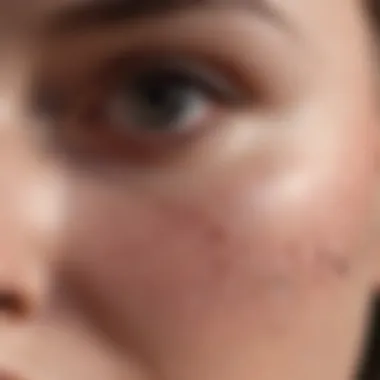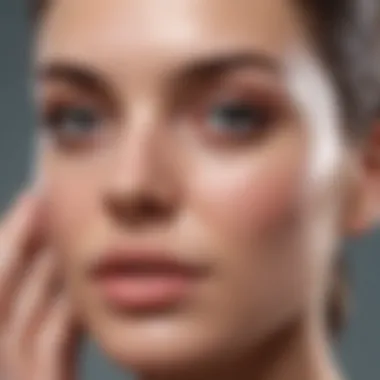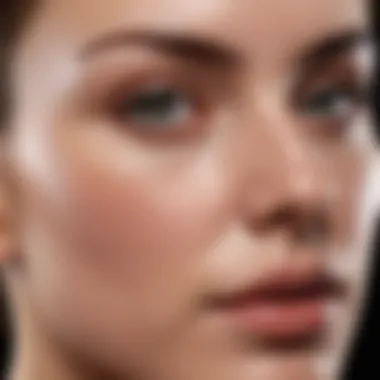The Ultimate Guide to Effective Blackhead Treatments


Intro
Blackheads are a common skin concern that can affect individuals of all ages. They occur when hair follicles become clogged with sebum, dead skin cells, and bacteria. This can lead to uneven skin texture and can sometimes be mistaken for other skin conditions. Understanding how to treat blackheads is essential for maintaining healthy skin. This comprehensive guide will provide insights into effective treatments, product recommendations, and preventive measures to incorporate into your skincare routine.
By exploring both at-home methods and professional treatments, readers can make informed decisions that enhance their skincare journey. In this guide, we aim to dispel common myths and provide practical solutions for treating blackheads effectively.
Trending Topics
Current Beauty Innovations
Skincare technology is continually evolving. Recently, formulations designed to combat blackheads have become more sophisticated. Notable advancements include products with salicylic acid, which penetrates pores and helps dissolve the buildup that leads to blackheads. Additionally, innovations like clay masks and charcoal strips are gaining popularity. These products work by extracting impurities and absorbing excess oil from the skin.
Popular Treatments in Skincare
The trend towards more natural and effective treatments has influenced how we approach skin health. Ingredients such as tea tree oil and niacinamide are now commonly included in formulations targeted at reducing blackheads. These ingredients not only help in removing blackheads but also promote overall skin health and balance oil production.
Step-by-Step Guides
Effective Beauty Routines
Creating an effective skincare routine involves several key steps to manage and prevent blackheads:
- Cleansing: Use a gentle, non-comedogenic cleanser twice a day to remove dirt and excess oil.
- Exfoliating: Exfoliate regularly with a chemical exfoliant like glycolic acid or salicylic acid to remove dead skin cells.
- Treatment: Apply targeted treatments containing active ingredients designed to unclog pores, such as retinoids or benzoyl peroxide.
- Moisturizing: Even oily skin needs moisture. Opt for an oil-free moisturizer to maintain hydration without clogging pores.
- Sun Protection: Apply sunscreen daily. Some treatments can increase skin sensitivity to sunlight.
Product Reviews
In-Depth Analysis of Popular Items
When selecting products for blackhead treatment, consider the following:
- Paula's Choice Skin Perfecting 2% BHA Liquid Exfoliant: Contains salicylic acid which is effective at unclogging pores and preventing blackheads.
- The Ordinary Niacinamide 10% + Zinc 1%: Helps to regulate oil production and diminish the appearance of pores.
- Neutrogena Oil-Free Acne Wash: A cleanser that removes impurities and prevents new blackheads from forming.
Comparative Reviews
Choosing a product can be challenging. Here’s a brief comparison of treatment methods based on effectiveness:
- Topical Treatments: Generally effective for mild blackhead issues but may not yield results quickly.
- Extraction Tools: Can provide immediate results but pose risks if not used correctly.
- Professional Treatments like Microdermabrasion: Offer deeper cleaning and long-term benefits but can be expensive.
"A consistent routine is the key to keeping blackheads at bay. Choose products wisely and give them time to work."
Understanding Blackheads
Understanding blackheads is crucial for anyone seeking effective treatment options. Blackheads not only affect the appearance of the skin but can also lead to further skin issues if not addressed properly. They form when hair follicles become clogged with excess oil and dead skin cells. This process can lead to inflammation and, possibly, other forms of acne.
The knowledge of blackhead physiology helps individuals identify suitable treatments and preventive measures. As this article explores various aspects, readers will gain insights into the underlying factors contributing to blackhead formation. Understanding blackheads lays the foundation for selecting the right products or methods for removal, contributing to a clearer complexion.
Definition and Characteristics
Blackheads, or open comedones, are a common skin condition characterized by small, dark spots on the skin, predominantly seen on the face, neck, shoulders, and back. They are referred to as "blackheads" because of their dark appearance, which is a result of the oxidation of the melanin in the clogged pore. Unlike whiteheads, which are closed comedones and appear as small, white bumps, blackheads are open to the air. This exposure to oxygen leads to the characteristic dark color.
Blackheads typically have a distinct texture that differs from surrounding skin. They can be easily identified due to their raised nature and the absence of inflammation.
Causes of Blackhead Formation
Several factors contribute to the development of blackheads:
- Excess Oil Production: Hormonal fluctuations can increase sebum production, making individuals more prone to blackheads.
- Dead Skin Cell Accumulation: When skin cells do not shed properly, they can accumulate in hair follicles, leading to blockages.
- Hormonal Changes: Hormonal shifts during puberty, menstruation, or due to certain medications can trigger an increase in oil production.
- Poor Skincare Practices: Inconsistent cleansing or use of heavy cosmetic products can exacerbate the problem.
- Environmental Factors: Pollution and humidity can introduce additional dirt and impurities that contribute to clogged pores.
These factors underscore the importance of an informed approach to skincare, balancing oil production and maintaining clean pores.
Skin Types and Blackhead Susceptibility


Different skin types exhibit varying susceptibility to blackheads. Individuals with oily or combination skin are generally more prone as they produce more oil, making it easier for pores to clog.
- Oily Skin: Characterized by excessive oil production, often leads to a higher incidence of blackheads.
- Dry Skin: While less common, dry skin can also develop blackheads if dead skin cells accumulate without sufficient exfoliation.
- Combination Skin: Those with combination skin may notice more blackheads in the oily areas, usually the T-zone (forehead, nose, and chin).
- Sensitive Skin: May be affected due to overly harsh products that irritate and lead to increased oil production.
Understanding your skin type allows for a tailored approach in selecting treatment options or preventive strategies for maintaining clear skin.
Assessing Treatment Options
Evaluating treatment options for blackheads is crucial for effective skincare management. This guide aims to provide insights into various methodologies, allowing individuals to make informed choices. When addressing blackhead concerns, understanding the different types of treatments available can lead to satisfactory outcomes. Careful assessment helps identify the most suitable methods considering skin type, blackhead severity, and personal preferences.
Over-the-Counter Products
Cleansers
Cleansers are fundamental in any skincare routine. They serve to remove dirt, oil, and other impurities that may contribute to blackhead formation. A key characteristic of cleansers is their ability to maintain skin pH balance while effectively cleansing pores. Many people choose gel-based or foaming cleansers for this purpose. The unique feature of cleansers lies in their formulations, often containing ingredients like glycerin that hydrate the skin while cleaning.
However, improper cleanser use can lead to dryness, so it is essential to select one suitable for one's skin type.
Exfoliants
Exfoliants help slough away dead skin cells, preventing them from clogging pores. This treatment is popular among individuals seeking clearer skin. Exfoliants can be chemical or physical; both types cater to specific skin needs. A notable characteristic of chemical exfoliants is their ability to penetrate deeper into the skin and promote cell turnover without manual scrubbing.
The advantage of using exfoliants is their effectiveness in blackhead prevention, yet over-exfoliation can cause irritation. Balance is key, ensuring a sensible application frequency.
Treatments with Salicylic Acid
Salicylic acid treatments target excess oil production and clear clogged pores. The key feature of salicylic acid is its oil-soluble nature, which allows it to penetrate deep into the skin, effectively breaking down the debris causing blackheads. This treatment is a beneficial choice for controlling acne and preventing further breakouts.
Although many users tout its effectiveness, some individuals may find salicylic acid irritating, necessitating careful introduction into their routines.
Pore Strips
Pore strips are designed to remove surface blackheads quickly. They function by adhering to the skin and pulling out impurities upon removal. A prominent trait of pore strips is their immediate visible results, which many find satisfying. They can be effective in the short term but do not address the underlying causes of blackhead formation.
Users should be aware that pore strips might not be suitable for sensitive skin types and can sometimes lead to further irritation, especially if used excessively.
Professional Treatments
Facials
Facials offer a comprehensive approach to managing blackheads. Professional extraction is a key aspect, where trained aestheticians perform deep cleaning tailored to individual skin needs. The characteristic of facials is the combination of various techniques like steaming, which opens pores for easier extraction. They are a popular choice for maintaining skin health and enhancing overall appearance.
While facials can provide immediate benefits, they require regular sessions for lasting effects, which could be a considerable investment.
Chemical Peels
Chemical peels involve applying a chemical solution to the skin, which promotes exfoliation and cell regeneration. The primary feature of these peels is their depth, influencing how they affect the skin. A chemical peel can eliminate dead skin cells and impurities, making it beneficial for blackhead treatment.
The disadvantage is the downtime associated with deeper peels, leading to redness and discomfort post-treatment. This option is best suited for individuals with specific skin concerns and must be performed under professional supervision.
Extraction Procedures
Extraction procedures are often performed during facials and involve physically removing blackheads using specialized tools. This direct method can be very effective when done correctly. The key characteristic is its immediate results, providing satisfaction to individuals seeking quick fixes.
Nonetheless, extraction must be executed by professionals to avoid damage or scarring, making it a less accessible choice for at-home treatment.
Natural Remedies
Honey and Lemon
Using honey and lemon is a popular natural remedy for blackheads. Honey has natural antibacterial properties, while lemon serves as a natural astringent. The combination is beneficial for purifying the skin and providing a gentle solution to blackhead removal. The key characteristic is the blend's soothing nature, making it suitable for many skin types.


However, this remedy may not provide immediate results and can lead to skin sensitivity for some individuals, especially those with citrus allergies.
Tea Tree Oil
Tea tree oil is renowned for its antibacterial properties. It helps manage oil on the skin while addressing blackheads effectively. Its unique feature is that it can be used in concentrated form or diluted with carrier oils. This versatility makes tea tree oil a popular choice among many individuals seeking natural treatment options.
However, it should be noted that undiluted tea tree oil can irritate the skin, so proper usage is crucial.
Baking Soda
Baking soda can be used as a gentle exfoliant to remove dead skin cells. Its granular texture assists in unclogging pores. The main characteristic is its availability and affordability, making it a common household remedy.
Despite these advantages, baking soda may disrupt skin pH and cause irritation for some people, which must be taken into consideration before use.
Assessing treatment options is essential for devising a personalized skincare plan. Understanding the benefits and constraints of each method aids in determining the best approach for individual needs.
The Role of Skincare Routines
Skincare routines are fundamental in managing blackhead issues. A consistent regimen ensures that the skin remains clean, balanced, and healthy. Proper routines contribute to the prevention of blackheads and enhance the efficacy of treatments used. By incorporating specific steps, individuals can minimize excessive oil production, remove dead skin cells, and maintain hydration, which all play a vital role in keeping pores clear.
Visibility of blackheads often correlates with lapses in care. Therefore, establishing a structured approach to skincare is essential, especially for those prone to congestion.
Daily Cleansing Techniques
Daily cleansing is non-negotiable in any skincare routine. Proper cleansing removes impurities, excess oils, and bacteria that can trigger blackheads. Choose a gentle cleanser suited for your skin type; formulations with salicylic acid can offer additional benefits. Cleansing twice daily is ideal; once in the morning and again at night.
A few guidelines to consider for effective cleansing:
- Use lukewarm water to avoid stripping the skin.
- Apply the cleanser with clean hands in circular motions, focusing on the T-zone where blackheads commonly form.
- Rinse thoroughly and pat dry with a clean towel.
Incorporating these steps can pave the way for clearer skin and optimize the removal of blackhead-causing blockages.
Exfoliation Frequency
Regular exfoliation is key to preventing blackheads. It helps remove dead skin cells, preventing them from clogging pores. However, frequency depends on individual skin types and conditions.
- For oily or acne-prone skin, exfoliating 2-3 times per week is typically beneficial.
- For dry or sensitive skin, limit exfoliation to once a week.
Opt for gentle exfoliants with either physical or chemical properties. Chemical exfoliants, like those containing glycolic or lactic acids, can effectively dissolve dead skin without abrasive action. Remember not to over-exfoliate; it can lead to irritation or increased oil production.
Hydration and Moisturization
Hydration is often overlooked in blackhead treatment, yet it is crucial. Proper hydration keeps skin cells balanced and prevents the overproduction of oil. Select lightweight, non-comedogenic moisturizers to ensure pores remain clear. Consider gel-based formulations for oily skin and cream-based for drier skin.
Here are key points to consider regarding hydration:
- Moisturize after cleansing to lock in moisture.
- Incorporate hydrating serums or toners with ingredients like hyaluronic acid for added benefits.
- Do not skip sunscreen during the day, as UV exposure can worsen skin conditions, including blackheads.
By integrating these elements, skincare routines can foster a healthier skin environment, reducing the likelihood of blackhead recurrence and supporting overall skin health.
Preventive Measures
Preventive measures are crucial for managing blackheads effectively. They address the root causes of blackhead formation, reducing the likelihood of recurrence. Implementing these measures can lead to healthier skin and less dependency on treatments.
Lifestyle Changes
Lifestyle changes encompass various factors that influence skin health. By making small adjustments, one's skin can significantly improve, lowering the chances of blackhead development.
Dietary Adjustments
Dietary adjustments play a substantial role in skin health. Consuming a balanced diet rich in fruits and vegetables can enhance the skin's appearance. Nutrient-dense foods promote detoxification and reduce inflammation, making them a beneficial choice. Eating foods high in omega-3 fatty acids, like salmon and walnuts, can also improve skin hydration. However, heavy consumption of sugary or greasy foods may trigger excess oil production. It is essential to be mindful of what is consumed to support clear skin.


Hydration
Hydration is key for maintaining skin elasticity and balance. Drinking adequate water daily helps flush out toxins and keeps skin cells hydrated. A well-hydrated body can effectively process nutrients, which reflects on skin clarity. Dehydrated skin often produces more oil, leading to clogged pores. Thus, adequate hydration is a preventive measure that enhances overall skin health.
Avoiding Clogging Agents
Avoiding clogging agents is essential for preventing blackheads. These agents are commonly found in various products that people use daily.
Cosmetic Products
Some cosmetic products may contribute to clogged pores. Products that contain heavy oils or fragrances can aggravate oily skin types. Opting for non-comedogenic products is key, as they are formulated to not block pores. Being vigilant about makeup removal before bed is also crucial. Neglecting this step can lead to a build-up of makeup and oil, fostering blackhead formation.
Hair Products
Hair products, including gels and sprays, can unintentionally contribute to blackhead formation. When these products come into contact with the skin, particularly on the forehead and temples, they can clog pores. Choosing lightweight formulas and ensuring thorough cleansing of the hairline can mitigate this issue. Therefore, being selective about hair products is significant in the prevention of blackheads.
Regular Skincare Assessments
Regular skincare assessments are important for maintaining healthy skin. Evaluating the effectiveness of products and routines helps identify what works and what does not. It can also signal changes in skin type over time, which might require adjustments to the skincare regimen. Regular check-ins with a dermatologist or skincare expert can provide personalized advice. Assessing skincare routines helps in preventing blackheads while optimizing overall skincare health.
Addressing Common Misconceptions
Understanding the myths and misconceptions surrounding blackheads is crucial for effective treatment and maintenance of skin health. Many individuals hold beliefs that can lead to misinformed decisions regarding skincare practices. By addressing these misconceptions, one can develop a more nuanced approach to prevent and treat blackheads, ultimately enhancing the overall health of skin.
Myths About Blackheads
One pervasive myth is that blackheads are a result of poor hygiene. In reality, blackheads often form due to clogged pores filled with excess oil and dead skin cells. While maintaining a clean face is essential, merely washing one's face frequently does not guarantee prevention.
Another common belief is that using harsh scrubs will eliminate blackheads. This approach can irritate the skin and may even worsen the condition by triggering increased oil production. Gentle exfoliation methods are typically more effective in addressing blackheads without causing inflammation.
Facts Versus Fiction
To clarify misconceptions, let’s look at a few key points:
- Fact: Blackheads can affect people with all skin types, not just oily skin. Those with dry or combination skin can also experience blackhead formation.
- Fiction: Only teenagers get blackheads. Although they are common during adolescence due to hormonal changes, adults can also struggle with this issue.
- Fact: Not all treatments are suitable for all skin types. Individual skincare needs vary, making it important to select appropriate products based on one's unique skin characteristics.
By distinguishing fact from fiction, individuals can make informed decisions that will lead to more successful management of blackheads.
Understanding Skin Health
A comprehensive grasp of skin health can greatly assist in preventing and treating blackhead formation. Skin health is influenced by a multitude of factors, including genetics, diet, and environmental influences. Individuals should recognize abnormal changes in their skin and seek appropriate interventions. A balanced diet rich in vitamins and antioxidants, coupled with adequate hydration, plays a vital role in maintaining skin health.
Moreover, understanding one’s skin type is fundamental. Different types respond differently to products, which highlights the necessity of personalized skincare routines.
"Knowledge is power; understanding what your skin needs is the first step toward clear skin."
For women of all ages, maintaining healthy skin is a continuous journey. Addressing misconceptions about blackheads empowers individuals to choose effective treatments and develop appropriate preventive measures. By doing so, they can achieve optimal skin health and enhance their self-confidence.
Closure and Recommendations
In this section, we will synthesize the key insights regarding blackhead treatments and their effectiveness. This guide has shown various options available, ranging from over-the-counter products to professional treatments and natural remedies. Each method presents its own strengths and weaknesses, making it essential to evaluate them based on individual skin types, sensitivities, and lifestyle needs.
Summary of Treatment Efficacy
The overall efficacy of treatments for blackheads varies significantly among individuals. Over-the-counter products such as cleansers and exfoliants often deliver noticeable improvements when used regularly. Ingredients like salicylic acid have shown reliable results in promoting skin shedding and keeping pores clear. Professional treatments, namely facials and chemical peels, offer more immediate solutions but may require a series of appointments for best results. Natural remedies, while gentler, can vary widely in effectiveness and may not suit everyone’s skin chemistry. Thus, understanding the effectiveness of these treatments is crucial in choosing the right approach for oneself.
Tailoring Treatments to Individual Needs
It is important to tailor treatments to individual skin requirements. Factors such as skin type—oily, dry, or combination—significantly influence which products will yield favorable results. A person with oily skin may benefit more from salicylic acid, while those with dry skin might need gentle exfoliants or hydrating ingredients to avoid irritation. Additionally, skin sensitivities play a critical role in this customization. Reading labels and possibly consulting a dermatologist can help identify suitable treatments. Everyone’s skin is unique, hence a one-size-fits-all approach is ineffective and often leads to frustration and prolonged blackhead issues.
Encouragement for Consistency
Consistency is fundamental in any skincare regime, particularly for blackhead treatments. Regular application of treatments is necessary to see significant improvements. Whether it is daily cleansing, weekly exfoliation, or professional appointments, ignoring a routine can result in a resurgence of blackheads. Setting small, achievable goals can enhance adherence to a skincare regimen. Furthermore, establishing a routine allows for tracking changes in skin condition, facilitating adjustments as necessary.
"Finding the right treatment is just the first step, but consistency is the key to achieving clear skin."
In summary, this guide emphasizes that understanding the underlying causes, assessing treatment options, and tailoring them to one’s needs are vital steps in effectively managing blackheads. By remaining consistent and informed, individuals can not only remove existing blackheads but also prevent new ones from forming.



